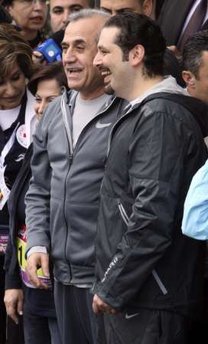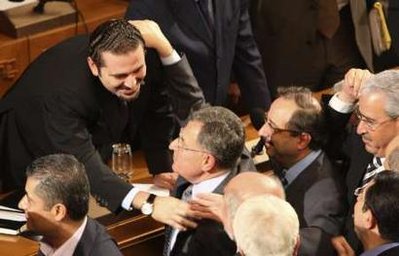 BEIRUT – Lebanese Prime Minister Saad al-Hariri’s government won a resounding vote of confidence from parliament on Thursday, paving the way for his expected visit to Syria for talks with the country’s president.
BEIRUT – Lebanese Prime Minister Saad al-Hariri’s government won a resounding vote of confidence from parliament on Thursday, paving the way for his expected visit to Syria for talks with the country’s president.
Raad added that political sectarianism constituted an obstacle to majority rule, which grants the majority the right to govern and the opposition the right to oppose.

Lebanon’s new government, which backs Hezbollah right to keep its arms, won the support of 122 of the 128-seat assembly. One deputy voted against while one abstained and four were absentees, speaker Nabih Berri said.
Parliament endorsed Hariri’s government after a 3-day debate during which the issue of Hezbollah’s arms was a heated topic.
Hariri, a 39-year-old Sunni Muslim businessman, had been keen on securing the backing of his powerful Shi’ite rivals, who are close allies of neighbouring Syria, to ensure a smooth launch for his administration.
No date has been set for Hariri’s expected trip to Syria for talks with President Bashar el Assad, but Lebanese media have said that it could be this month.
Before the vote, Hariri told the assembly that Lebanon was looking for better relations with Arab countries.
"We specially look forward to Lebanese and Syrian relations founded on brotherly ties … based on respecting the sovereignty of both countries," he said.
Hariri’s coalition, backed by the United States and Saudi Arabia, had accused Syria of assassinating statesman Rafik al-Hariri Saad’s father, in February 2005.
Syria denies any links, but the killing forced Damascus to end its 29-year military presence in Lebanon in April 2005 and led to the formation of a special court in The Hague to investigate and prosecute the killers.
Lebanon remained without a functioning government for months after June elections which Hariri’s coalition won over Iranian and Syrian-backed Hezbollah and its allies.
But with Syria and Saudi Arabia keen to improve bilateral ties and ease political and sectarian tensions in Lebanon, they nudged their allies to agree on a unity government that gave Hariri’s coalition 15 ministers in a 30-member cabinet, Hezbollah and its allies 10 and President Michel Suleiman five.
Hariri’s government, which he formed last month, had also pledged to tackle economic woes and financial stability. Lebanon had largely shrugged off the effects of the global financial crisis but has public debt of around $50 billion (30.7 billion pounds).
"People want electricity, people want clean environment, clean water and people want justice (in getting) education and health care," Hariri told the parliament.
(Writing by Mariam Karouny; Editing by Charles Dick)
Saad Hariri. Before he received the confidence of parliament, the prime minister reached out to the country’s big neighbour, Syria, with which relations had been strained during the past five years. ”We especially look forward to Lebanese and Syrian relations founded on brotherly ties … based on respecting the sovereignty of both countries,” said Mr Hariri. The country’s media have speculated that he will visit Damascus soon to emphasise the improved ties.
Prime Minister Saad Hariri left on an official visit to Saudi Arabia Friday night for meetings with top Saudi officials. President Michel Sleiman leaves for Washington on Saturday, for discussions with US President Barack Obama. The Lebanese head of state and his premier’s foreign visits come after the Cabinet received a record number of confidence votes on Thursday, despite the controversial issues of Hizbullah’s arms and the abolition of political sectarianism. Prior to his departure to Saudi Arabia, Hariri held talks with Sleiman at Baabda Palace but made no statement following the meeting.
French Foreign Minister Bernard Kouchner congratulated the Cabinet and Hariri for receiving the vote of confidence, adding that it would allow the government to work seriously to strengthen the state institutions, as well as Lebanon’s stability and security.
The French minister voiced France’s full support for Hariri as well as its commitment to defend Lebanon’s unity, stability, sovereignty and independence.
Kouchner also stressed the need to continue the implementation of Security Council Resolution 1701, which helped end the 2006 war.
Similarly, Iranian Vice President Mohammad Riza Rahimi congratulated Hariri for the formation of the new Cabinet, inviting him to visit Tehran, and stressing that Lebanon deserved stability and security.
Rahimi also praised the Lebanese for their victories against Israel.
A possible trip by Hariri to Syria following his stop in Saudi Arabia and prior to his participation in the Copenhagen Climate Change Summit remained unclear as of Friday.
A recent rapprochement between the two regional powerbrokers Syria and Saudi Arabia facilitated breaking the political deadlock in Lebanon and the formation of the new national unity Cabinet.
During his visit to the US, Sleiman will be accompanied by Deputy Premier and Defense Minister Elias Murr, Foreign Minister Ali Shami and State Minister Wael Abu Faour.
Sleiman is expected to tackle with Obama a potential increase in Washington’s level of military aid to Beirut, the issue of Palestinian refugees in Lebanon, and the Middle East peace process.
A statement issued by Baabda Palace on Friday said Sleiman would also hold talks at Congress with Speaker Nancy Pelosi, and hold separate meetings with Secretary of State Hillary Clinton, Defense Secretary Robert Gates and Transportation Secretary Ray Lahoud.
Meanwhile, Lebanese Forces leader Samir Geagea said Friday he supported a visit by Hariri to Syria, provided it involves an agenda of talks that cover disputed issues between both countries.
Following his visit to Hariri at his residence in Downtown Beirut, Geagea said the timing of summoning warrants from the Syrian judiciary prior to Hariri’s trek to Damascus indicated that Syrian officials did not want the visit to happen.
Politicians from the March 14 Forces camp have said the warrants, in connection with the murder of former Premier Rafik Hariri, aimed to undermine Hariri’s position ahead of his Damascus visit.
“Every time the Lebanese show a will to improve relations with Syria, developments take place showing that there is no will for good ties,” said Geagea.
Commenting on the visit to Damascus by Free Patriotic Movement leader Michel Aoun on Wednesday, Geagea called the trip a message to Sleiman and Lebanese Christians.
“Syria’s message is whoever gets closer to us, we’ll lay down the red carpet for him, fix matters for him, stay behind him and bring him support,” Geagea added.
As for criticism by the minority of Sleiman’s visit to the US, Geagea said March 14 parties should be the ones blaming the president for his stances on Independence eve and Army Day, particularly with regard to the resistance.
“I don’t know what resistance we are discussing, since a resistance should embrace all the Lebanese people, so we should be the ones blaming the president for listening to the Americans while on the contrary his stances are leaning toward the [minority],” Geagea said.
Free Patriotic Movement leader Michel Aoun denied on Saturday that he carried a message from Syria to President Michel Suleiman and said the Lebanese head of state has the right to visit any country he wants.
Following his more than one hour talks with Suleiman at Baabda palace, Aoun told reporters that he didn’t carry a message from Syria. The MP met with Syrian President Bashar Assad earlier in the week.
The FPM leader also said that Suleiman has the "constitutional right" to visit any country he wants after criticism by some pro-Syrian forces of the Lebanese president’s trip to Washington on Saturday.
Suleiman is scheduled to meet with U.S. President Barack Obama on Monday.
Aoun told reporters that he had identical points of view with Suleiman and denied the president was biased. The head of state is committed to the presidential oath, the lawmaker stressed.
Asked about a request by a Syrian court for 25 Lebanese figures, including the police chief and top prosecutor, to appear for questioning, Aoun said the demand is a "judicial issue."
An Nahar daily quoted FPM sources as saying that Aoun could possibly visit Saudi Arabia. Sources following up the MP’s meetings said that during his visit to Syria, Aoun brought up the issue of his trip to Riyadh hoping Assad would lay the ground for it.
Separately, Akkar MP Hadi Hobeish said the resistance couldn’t be legitimate unless this was specified in legislation. He said the phenomenon of the resistance contradicted the Constitution, which gives the executive branch sole authority over the possession of weapons.
Hobeish called for the Lebanese state to be granted authority over Hizbullah’s arms in the framework of a national defense strategy to be agreed upon among the Lebanese.
The Future Movement MP added that the Syrian summoning warrants were not positive signs ahead of Hariri’s expected visit to Damascus.
Earlier in the day, Hariri inaugurated the Beirut Arab and International Book Fair on Friday, where he stressed that the aspects of social and economic growth would unite with that of stability and security in the upcoming period in the country, while underlining the importance of national coexistence among the Lebanese.
BEIRUT: Well informed judicial sources told The Daily Star on Friday that summoning warrants issued by the Syrian judiciary were still being evaluated by the Consultation and Legislation committee as well as the state prosecutor’s office, after which the Justice Ministry would conclude its legal evaluation and issue a response.
The Syrian judiciary ordered the summons against 25 local officials and figures after former General Security chief Jamil al-Sayyed filed a lawsuit in connection with his detention for four years in the Hariri assassination case.
The sources said the response would be based upon the Lebanese-Syrian judicial agreement and Lebanese Code of Criminal Procedure, and not on political considerations.
“The judiciary is dealing seriously with the warrants but cannot contradict the legal procedures to be followed; thus its response would be based on the legitimacy of the Syria warrant,” a judicial source said.
On Thursday, the Justice Ministry received a second official letter from the Syrian Embassy in Beirut, along with 25 attached summoning warrants filed by the Damascus First Prosecutor on November 23.
The summoning notices were issued by the Syrian judiciary upon Sayyed’s request against Lebanese official figures for allegedly giving false testimony against the former general.
The source added that complying with the immunity granted to figures ordered to present themselves before the Syrian judiciary should be respected in accordance with Lebanese law.
The source underscored Syria’s earlier response to the Special Tribunal for Lebanon’s demand to question Syrian officers in Beirut, a request Damascus said harmed its sovereignty and independence. This response led to their questioning in Vienna at the time the Syrian judiciary was demanding that high-profile figures present themselves to Syria, disregarding their parliamentary and judicial immunity.
Lawmakers in the parliamentary majority have said that the warrants aim to undermine Prime Minister Saad Hariri’s position ahead of his expected visit to Syria.
The Lebanese judiciary’s Legislation and Consultation Committee has determined that the Syrian request, which was first made late Tuesday, was illegitimate, a judicial source told The Daily Star Thursday.
Sayyed was one of the four generals who were held in connection to the 2005 assassination of former Prime Minister Rafik Hariri. He was released in 2009 without ever being charged with a crime.
Separately, Labor Minister Butros Harb said the warrants were improperly delivered to Lebanon, adding that ne believed the issue was, in part, politically motivated.



